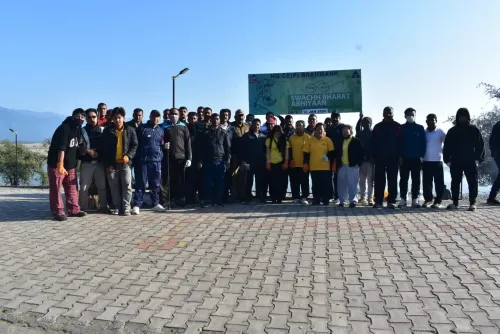Did CBI Really Arrest 3 Military Engineers and an Aide for Rs 80,000 Bribe?

Synopsis
Key Takeaways
- CBI arrests three military engineers for bribery.
- Bribe amount was Rs 80,000.
- Investigation initiated based on a contractor's complaint.
- Legal actions are based on the Prevention of Corruption Act.
- Searches revealed incriminating evidence.
New Delhi, Sep 12 (NationPress) The Central Bureau of Investigation (CBI) has apprehended three officials from the Military Engineer Services (MES) in Madhya Pradesh, along with a middleman, for allegedly receiving a bribe of Rs 80,000 from a contractor involved in repair and maintenance work, as confirmed by an official on Friday.
The individuals detained include Nitesh Kumar Singh, the Garrison Engineer (GE) from MES in Sagar, Rakesh Sahu, the Assistant Garrison Engineer (AGE), Deepak, a Junior Engineer (JE), and the intermediary Rajesh Mishra.
The CBI initiated an investigation on Thursday following a complaint lodged by Ajay Kumar, an employee at Shree Balaji Associates, who claimed the accused public officials demanded a bribe of Rs 1 lakh to facilitate the execution of a Rs 26.58 lakh contract.
The FIR was filed under Sections 7 and 7A of the Prevention of Corruption Act, which pertain to the attempt to accept undue advantage, and Section 61(2) of the Bharatiya Nyay Sanhita, related to criminal conspiracy.
The bribe was requested to ensure the contractor could access the contract site for carrying out necessary repair and maintenance tasks.
After negotiations, the perpetrators consented to accept a bribe of Rs 80,000, representing 1.5 percent of the contract value from the complainant.
The CBI executed a sting operation and successfully caught the four individuals in the act of accepting the Rs 80,000 bribe from the complainant.
Additionally, the CBI conducted searches at the residences and offices of the accused, uncovering several incriminating documents and items.
The arrested individuals were subsequently presented before the Special CBI Judge to request remand for further questioning.
Ajay Kumar, who acts as a power-of-attorney holder for the contracting firm Shree Balaji Associates in Sagar, indicated that the firm’s owner, Narendra Kumar Gupta, was approached by Rajesh Mishra for the illicit payment.
Ajay Kumar stated in his complaint that neither he nor the firm’s owner was willing to pay the demanded Rs 1 lakh bribe. Following this, he filed a complaint at the CBI's Jabalpur office on September 8.










